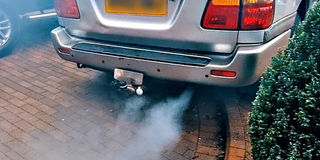Ask the Mechanic

WHY DOES MY CAR PRODUCE SMOKE IN THE MORNING?
Dear Paul, My Toyota Land Cruiser Prado releases a lot of smoke in the morning, even when I have just serviced it. What could be the problem?
Karim
Your car must produce smoke as a byproduct of the engine combustion process (burning of the fuel air mixture). The quality (colour) and quantity of smoke will tell a lot about the working condition of your Toyota.
The colour of smoke will be different according to the different faults in your engine. Blue smoke is often caused by broken piston rings or damaged valve stem seals, which allow engine oil to infiltrate the combustion chamber and get burnt with the fuel air mixture.
Given your recent engine oil service and the suggestion that the smoke is only excessive shortly after the cold engine starts, I think your car produces black smoke.
Excessive black smoke from your exhaust is often caused by the presence of an imbalanced fuel air ratio with more fuel than air (running rich) in the combustion chamber.
There are several causes of this situation, including excessive buildup of dirt in the air cleaner, failure of the throttle valve to open fully or due to the buildup of soot which prevents free and prompt engine air in-flow and the buildup of appropriate fuel air ratios.
On the other hand, leaking or malfunctioning fuel injectors may deliver too much fuel while failure of engine management components such as the oxygen sensors will cause a delivery of more than enough fuel. Some of the above faults or features may occur regardless of whether you have carried out the routine engine oil and filter service or not.
In case your exhaust smoke is black but reduces when the engine is hot, it may be because the engine’s cold start idling revolutions have slowed down after the engine warms up.

CAUSES OF A CLUNKING SOUND FROM THE ENGINE
Hello Paul, I have driven my Pajero iO (2000 model, 4G94 engine) for nine years now. Of late, it has developed a clunking noise from the engine. A mechanic advised that I change its hydraulic tappets or engine oil. The engine has never been overhauled and I always use reliable engine oil. What could be causing this noise and how can I solve it. Is it time to overhaul the engine?
Denis
Hello Denis, the noise seems to be caused by engine oil pressure rather than the choice of oil type. Upper engine noise, as suggested by the mechanic, could be caused by delayed engine oil pressure buildup after cold starts. An engine overhaul is usually needed when the engine has low compression, which is a sign that engine oil has leaked through the piston rings. You can improve engine oil pressure by cleaning the oil pick up strainer in the sump. It might be clogged by dirt and sludge from its history.

WHICH SUV IS BETTER, KLUGER OR VANGUARD?
Hello Paul, help me make a choice between a used Kluger 2.4l-2006 model and a used Vanguard 2.4l -2006 or 2004 model.
Robert
Hello Robert, whereas the 2006 Toyota Kluger and 2006 Toyota Vanguard are both sports utility vehicles with different attractions for customers, the Kluger is a bigger and more spacious SUV with a more imposing presence.
The Vanguard, on the other hand, offers decent legroom but may be a bit cramped up for five adults during a road trip. Also, the Vanguard will be a better city run about car since it is smaller and easier to park and one can easily avoid boda boda scratches as it manoeuvres through Kampala streets.
The Kluger comes with the 2.7 litre and 3.5 litre petrol engines which are thrilling to drive on the highway but will be more fuel thirsty and more costly to service than the Vanguard’s 2.4 litre engine.
The Kluger has a more premium interior package and layout with keyless entry in addition to push start convenience. The Vanguard comes in tow with push start and other basics such as air conditioning and power windows.
The Kluger has the more offroad centric full time 4WD while the Vanguard has the optional lighter duty all-wheel drive. But that may not matter if you are more of a city dweller.
The road handling characteristics of the bigger Kluger make highway driving more confident and relaxed as it has better road holding and stability, which is complimented with the ABS + Stability control as opposed to the smaller Vanguard which comes with ABS alone. Hopefully, this helps you make up your mind.

REPLACING A CAR’S THERMOSTAT
Hello Paul, I am also a mechanic. I recently read your article in the Daily Monitor giving a recommendation to replace an old thermostat with a new one. I would like to know what could happen if I do not replace the thermostat.
Richard
Engine thermostats are designed to help an engine reach the operating temperature promptly. The thermostat is a heat operated spring valve which is designed to let coolant flow into the engine at temperatures between 85-95 degrees Celsius depending on the car generation.
The thermostat is designed to help the engine attain the normal operating temperature, which allows it run efficiently providing good performance, optimum fuel economy and acceptable emissions. Eliminating the thermostat makes the engine run inefficiently with high revolutions as the computer gets cool engine temperature signals.
The thermostat also helps to regulate engine temperature by keeping coolant fluid in the radiator long enough to cool down before allowing it to flow when the engine temperature exceeds the normal operating temperature.
This could explain why an engine without a thermostat may tend to run at higher than normal temperature.
Eliminating the thermostat will lead to the engine running inefficiently, with poor emissions and gradual damage.
Send sms: mycar (space) your comments and questions to 6933 or email them to: [email protected]




